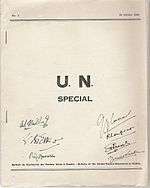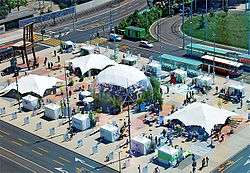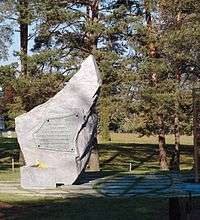UN Special (magazine)
UN Special, renamed NewSpecial since February 2020,[1] is a monthly magazine aimed at international civil servants working in the United Nations system in Geneva. It is published alongside UN Today, which separated from the magazine to focus on issues selected by UNOG's Staff Union.[2]
| Editor-in-Chief | Alex Mejia |
|---|---|
| Deputy Editor | Dr Garry Aslanyan |
| Categories | International magazine- magazine of the International civil servants (functions at voluntary basis!) |
| Frequency | 10 times a year |
| Total circulation | 10,500 |
| Year founded | 24 October 1949 |
| Country | Switzerland (Geneva) |
| Language | English/French, bilingual |
| Website | www.unspecial.org |
First published in October 1949, it has since published 11 issues annually, with an average of 50 pages. Similar to Ex Tempore, the literary magazine of the United Nations Society of Writers, UN Special functions on a voluntary basis, with staff from the UN and other Geneva-based international organizations and agencies contributing in their free time, beyond their formal duties; it also collaborates closely with the Swiss Press Club.[3] A nonprofit, noncommercial magazine, it seeks to embody the UN's cooperation between people of all backgrounds. UN Special offers a window into international organizations, diplomatic missions, academia and various other entities in order to promote mutual understanding and foster synergy in the work covered by their respective mandates. It offers dialogue and reflection to renew a spirit of cooperation and humanitarianism, not only for international Geneva, but also worldwide.
In April 2020, for the first time in its history, NewSpecial was disseminated in an electronic format because of the COVID-19 pandemic. It has been recognized am outstanding -professional journalism.[4][5] On the eve of the 70th anniversary of the United Nations, UN Special was nominated for a UN Secretary-General Awards,[6] and selected as finalist in the category: Staff Volunteerism.[7]
UN Special changed its name to NewSpecial to make space for UN Today and allow both magazines to coexist.
History

The first issue of UN Special was published on 24 October 1949. It was handwritten and the cover was signed by the members of the Editorial Committee at that time. Among the articles, essays and UN announcements in this very first issue under the Chief Editor R.J Spencer, we find a welcoming address by Wladimir Moderow, the representative of the Secretary-General, the Director-General of the European Office of the United Nations (the nation of the United Nations Office at Geneva in 1949) and by Gunnar Myrdal, Executive Secretary of the United Nations Economic Commission for Europe, UNECE. Another interesting contribution was dedicated to the celebration of the United Nations Day, announcing public reading of the Preamble of the UN Charter. This first issue contained 22 black and white pages without defined columns and without photos.
Over the years, the UN Special has developed to become a professional 50 page-magazine with an average of 32 articles, mainly in English and French (the six official UN languages are English, French, Russian, Spanish, Arabic and Chinese). Earlier, the content of the magazine tended to focus on UN staff issues, however, with its development and increase in outreach, the magazine covers a broad range of topics related to the work of international organizations and governance, such as peace-keeping, poverty reduction, human rights, climate change mitigation, environmental protection, natural disaster management and the status of the Millennium Development Goals (MDGs). The recent global discussions on greening the economy and enhancing sustainable development are reflected in the magazine due to the engagement within these topics of those contributing to the UN Special. Cultural and environmental world heritage sites (listed by UNESCO), find their coverage in the magazine as well.
In October 2009, the exhibition “UN Special magazine: History over 60 years” was inaugurated in the Palais des Nations in Geneva. The exhibition traced the development of UN Special from the very first magazine in 1949, highlights key moments in the history of the United Nations, as experienced and told by staff. The exhibition was visited by the Secretary-General of the United Nations Ban Ki-moon.[8] The Director-General of the United Nations Office at Geneva Sergei Ordzhonikidze in his opening remarks to mark the 60th anniversary of the UN Special magazine noted: "I believe that UN Special embodies both the United Nations’ unique ability to facilitate cooperation between people of all backgrounds and its capacity to adjust to ever-changing circumstances – without losing sight of the overall objectives".[9]
In summer of 2015, the UN Special Staff Magazine submitted the nomination for the United Nations Secretary-General Awards (UNSG Awards) that honour individual staff members or teams who promote innovation, efficiency and excellence in the way the Organization delivers its programmes and services. On the eve of the 70th anniversary of the United Nations, the UN Special Staff Magazine was announced shortlisted in the category: Staff Volunteerism, for the collective work of the colleagues who promoted Organizational values through the commitment of personal time and/or expertise to a deserving cause outside their job description.
Mandate and policy
The Editor-in-Chief and the Deputy Editor-in-Chief are elected for the period of two years from the candidates who presented their candidatures voluntary. The magazine had also two Associate Editors, and Editorial Board, who, in majority, were the international civil servants and who collaborated in the magazine at voluntary basis. The policy of the magazine was to have a broad variety of subject, and at the same time to be politically, religiously and gender neutral.
Projects
- "In Memoriam of our Colleagues who Perished on Duty" - unveiling of the Memorial in the Ariana Park, Day of Remembrance (proposal to designate a specific day)
- Humanitarian assistance
- Restoration of the Celestial Sphere Woodrow Wilson Memorial as a symbol of Peace
- Proposal to re-erect the Temple of Peace and Friendship marking two centuries of peace actions in Geneva (Temple was erected by the Count Jean-Jacques de Sellon, the founder of the first European Peace Society, i.e. "la première Société de la paix sur le continent européen"[12])
- UN Special and Geneva International[13]
- UN Clubs[14]
- United Nations Orchestra[15]
- UN Special meets children needs[16]
Achievements
UN Green Day

On 5 June 2010, the United Nations family sponsored a celebration of World Environment Day. A record number of 6,500 accepted the invitation to visit Ariana Park, which was opened also to mark the International Year of Biodiversity. Many activities were organized by the United Nations Environmental Programme (UNEP) on the Place des Nations, and the World Intellectual Property Organization (WIPO) opened its doors to the public for the first time.
Based on an idea from UN Special magazine and from its editor-in-chief,[17] the event (also called UN Green Day[18][19]) was made possible through the efforts of an organizing committee drawn from the United Nations Geneva office, UNEP and WIPO, as well as contributions and assistance from the Swiss Confederation, the Canton and City of Geneva, the permanent missions of Brazil, Denmark, Italy, Japan and Rwanda and other partners.[20]
Memorial to honour those who lost their lives for peace

Special attention and tribute was given to United Nations staff and international civil servants who lost their lives under the duties of the United Nations in different parts of the world. A special Memorial was inaugurated at the initiative of UN Special with the support of the United Nations Secretary General and under the auspices of the United Nations Office at Geneva Director-General to commemorate those who lost their lives for the high ideals of the United Nations Memorial to honour those who lost their lives for the high ideas of the United Nations [21][22][23] (see UN Special No.600). The Memorial was inaugurated at the grounds of the Palais des Nations, in the Ariana Park, in 2003.
This Memorial in Ariana Park symbolizes all UN peacekeepers and a celebration of the International Day of United Nations Peacekeepers takes place at the grounds of this Memorial to remember those who served in the UN peacekeeping operations and to honor the memory of those who died in the name of peace. Each year, at the end of May, UN staff and the Soldier for Peace International Association come to this Memorial to pay tribute to the women and men who serve, or have served, in United Nations peace missions across the globe, to salute their courage and commitment, their dedication and determination to serve fellow human beings in dangerous and difficult circumstances. Special ceremony is conducted near this Memorial in Ariana Park to honour more than 2,500 civilian and military personnel who have died in the line of duty since 1948. Near this Memorial UN colleagues vow to remember them, and pledge to carry on their efforts, to honour their memory and to ensure that their sacrifice will serve the cause of peace and stability in the world.
"Rice is life"
"Rice is life" was selected as the slogan for the International Year of Rice 2004. The slogan illustrated the significance of rice across the globe, and its importance to nutrition, livelihood, culture, and the natural environment. On the occasion of the International Year of Rice decided by the United Nations General Assembly, the UN Special magazine together with the United Nations family, the World Health Organization (WHO) and the Food and Agriculture Organization (FAO) prepared an international cookbook, Rice Around the World. From Santiago to Bangkok, from Beijing to The Cape, from Tashkent to Cairo, rice nourishes more than 3 billion people throughout the world. In each of these cities, in each of these countries, from the richest to the poorest, each one has its own way of accommodating rice, or rices as there are so many types. The book was prepared by the international civil servants as well as goodwill people from all over the world. The so-called "Rice Team" from the UN Special Editorial Board collected, compiled and put such a book together offering to its readers to go around the world with 300 recipes from over 100 countries. The benefits were donated to the UNICEF to help fighting against hunger.
Featured interviews
- Ban Ki-moon, Secretary-General of the United Nations.[24]
- Kofi Annan, former Secretary-General of the United Nations.[25]
- Navi Pillay, UN High Commissionner for Human Rights <https://web.archive.org/web/20110228081731/http://www.unspecial.org/UNS679/t23.html>
- Sergei Ordzhonikidze, Director-General of the United Nations Office at Geneva <https://web.archive.org/web/20110504002244/http://www.unspecial.org/UNS683/t21.html>
- Jimmy Wales, The founder of Wikimedia Foundation <https://web.archive.org/web/20110721043102/http://www.unspecial.org/UNS694/t21.html>
- Jacques Rogge, President of the International Olympic Committee <https://web.archive.org/web/20100831024525/http://www.unspecial.org/UNS696/t21.html>
- Sashi Tharoor, former Deputy General-Secretary of the United Nations <https://web.archive.org/web/20110228080724/http://www.unspecial.org/UNS667/t3A.html>
- Dr. Margaret Chan, Director-General of the World Health Organization <https://web.archive.org/web/20110308014403/http://www.unspecial.org/UNS684/t21.html>
- Gordon Martin, OBE, Honorable member of the Swiss Press Club (Club suisse de la presse) <https://web.archive.org/web/20110721043444/http://www.unspecial.org/UNS666/t21.html>
- Abdou Diouf, La Francophonie International Organisation Secretary-General <https://web.archive.org/web/20110228080540/http://www.unspecial.org/UNS667/t21.html>
- Anders B. Johnsson, Secretary-General of the Inter-Parliamentary Union <https://web.archive.org/web/20101024015507/http://www.unspecial.org/UNS697/t21.html>
References
- "News Special, revue du personnel des Organisations Internationales, Genève". newSpecial. Retrieved 2020-06-28.
- "UN Today". UN Today. Retrieved 2020-06-28.
- Archived July 7, 2011, at the Wayback Machine
- Tribune de Genève,octobre 2009
- https://www.unog.ch/80256EE600583A0B/(httpPages)/ECE0B4E8A7D6F853C12576400049E475?OpenDocument&year=2009
- The UN Secretary-General Awards honour individual staff members or teams who promote innovation, efficiency and excellence in the way the Organization delivers its programmes and services.
- The caterogy Staff Volunteerism includes individual staff members or teams who promoted Organizational values through the commitment of personal time and/or expertise to a deserving cause outside one's job description.
- "Archived copy". Archived from the original on 2011-07-21. Retrieved 2010-11-17.CS1 maint: archived copy as title (link)
- http://www.unog.ch/unog/website/dg.nsf/(httpSpeechesByYear_en)/ECE0B4E8A7D6F853C12576400049E475?OpenDocument&year=2009&navunid=DA1302D9298CEF1E80256EF700760B0B
- "Archived copy". Archived from the original on 2011-07-21. Retrieved 2010-11-17.CS1 maint: archived copy as title (link)
- "Archived copy". Archived from the original on 2011-07-21. Retrieved 2010-11-17.CS1 maint: archived copy as title (link)
- Ivo Rens et Klaus Gerd Giesen in Revue suisse d'histoire,1985.
- "Archived copy". Archived from the original on 2011-07-21. Retrieved 2010-11-17.CS1 maint: archived copy as title (link)
- "Archived copy". Archived from the original on 2010-11-25. Retrieved 2010-11-17.CS1 maint: archived copy as title (link)
- "Archived copy". Archived from the original on 2011-03-07. Retrieved 2010-11-17.CS1 maint: archived copy as title (link)
- "Archived copy". Archived from the original on 2010-11-25. Retrieved 2010-11-17.CS1 maint: archived copy as title (link)
- "Archived copy". Archived from the original on 2010-08-31. Retrieved 2010-11-17.CS1 maint: archived copy as title (link)
- "Archived copy". Archived from the original on 2010-10-24. Retrieved 2010-11-17.CS1 maint: archived copy as title (link)
- "Archived copy". Archived from the original on 2010-08-31. Retrieved 2010-11-17.CS1 maint: archived copy as title (link)
- "Welcome journeeverteonugeneve.org - BlueHost.com". Journeeverteonugeneve.org. Archived from the original on 2016-01-09. Retrieved 2016-01-03.
- "Archived copy". Archived from the original on 2011-07-21. Retrieved 2010-11-17.CS1 maint: archived copy as title (link)
- "Archived copy". Archived from the original on 2010-05-05. Retrieved 2010-11-17.CS1 maint: archived copy as title (link)
- "Archived copy". Archived from the original on 2011-07-21. Retrieved 2010-11-17.CS1 maint: archived copy as title (link)
- "UNSpecial N° 705 — Avril 2011 ¤ Interview of the month". web.archive.org. 2011-07-21. Retrieved 2020-06-28.
- "UN Special No 600". web.archive.org. 2011-07-21. Retrieved 2020-06-28.